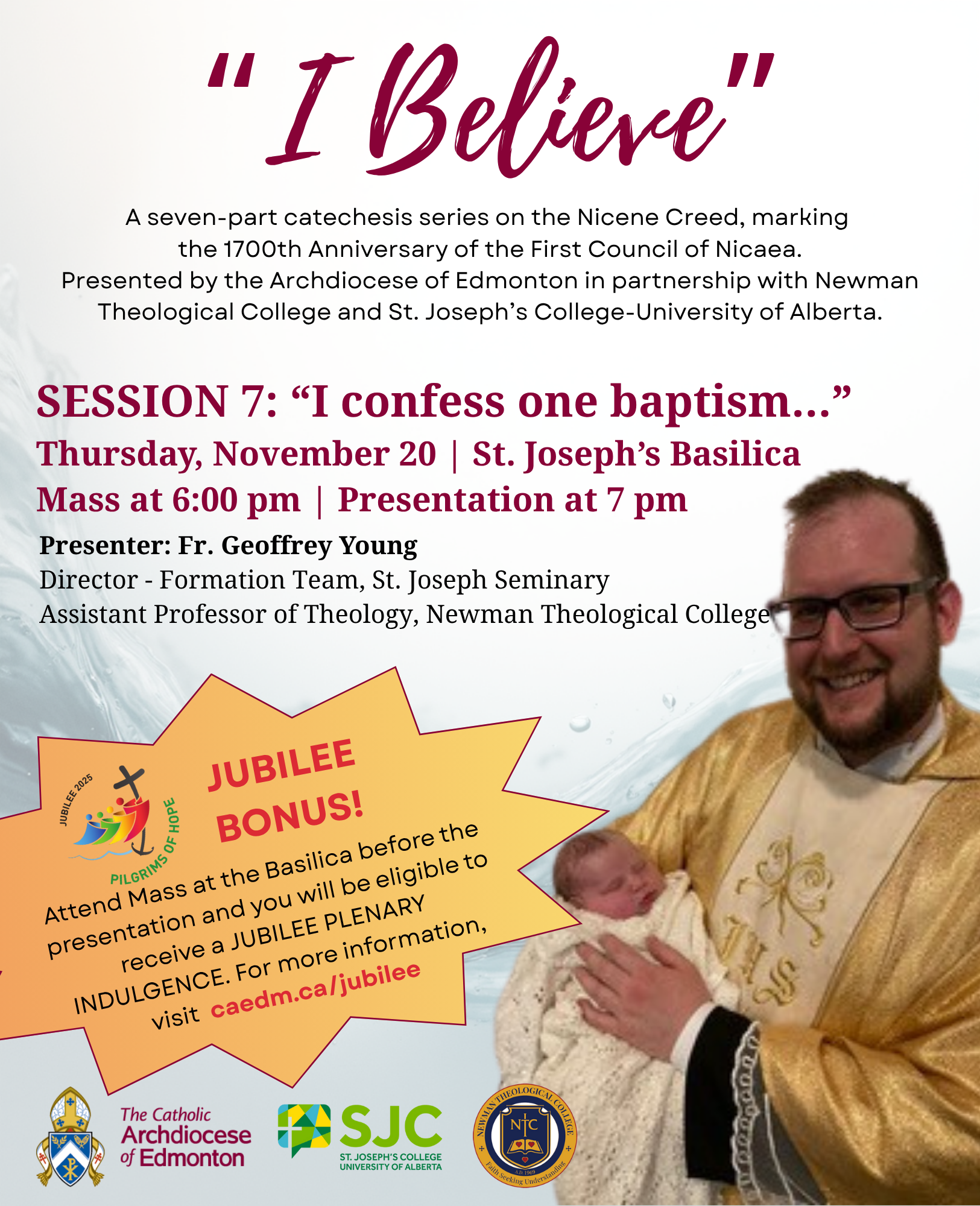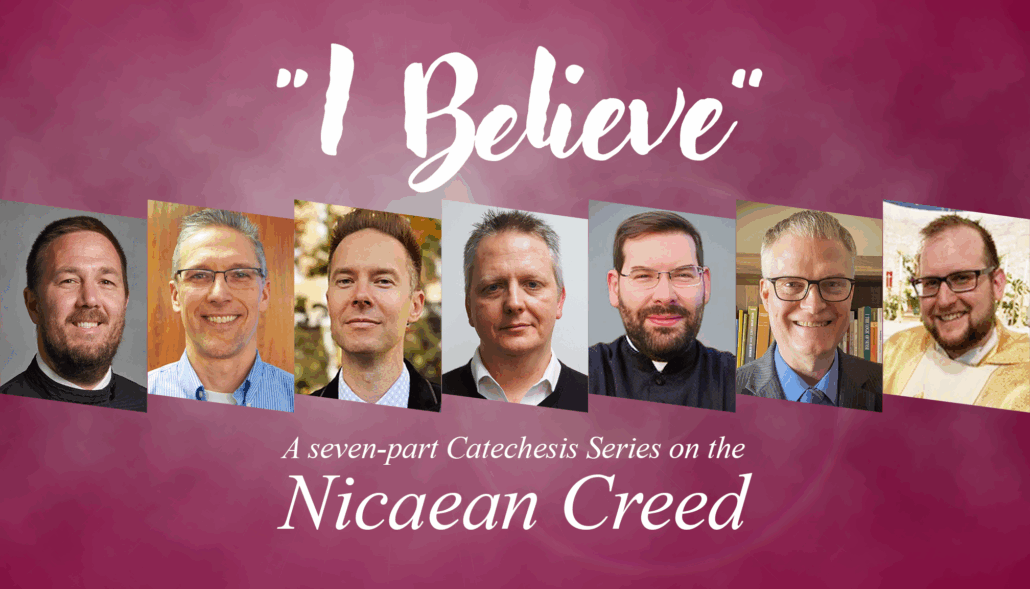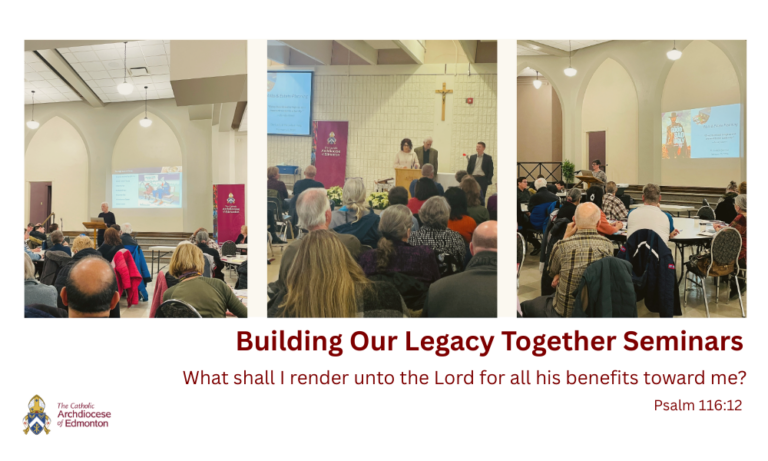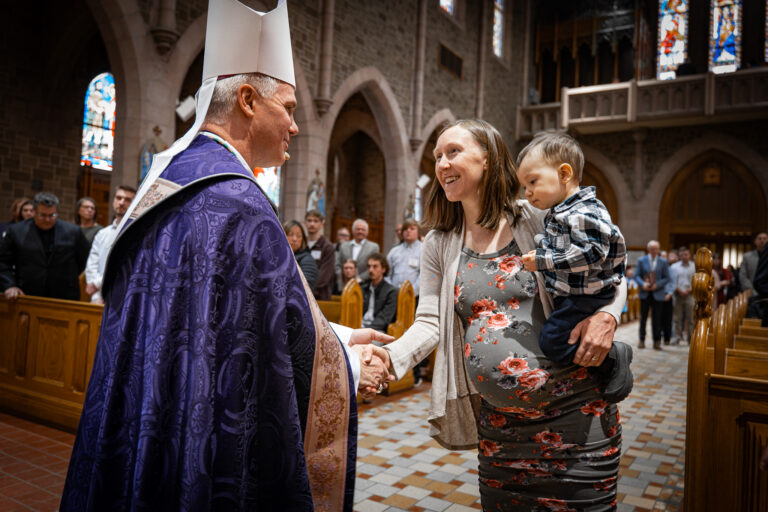This 2025 Jubilee Year marks the 1,700th anniversary of the First Ecumenical Council in Nicaea, which developed the Creed. To mark the occasion, the Archdiocese of Edmonton has launched “I Believe,” a catechesis series in partnership with St. Joseph’s College (University of Alberta) and Newman Theological College.
The “I Believe” series, livestreamed on the Archdiocese YouTube page, stems from the Archdiocese’s Pastoral Priorities focusing on three aspects of formation. One of the priorities is the formation of confident witnesses to the faith.
 Fr. Geoffrey Young’s presentation is the last in the seven-part Nicene Creed Series and will focus on the proposition from the Creed: “I confess one baptism”
Fr. Geoffrey Young’s presentation is the last in the seven-part Nicene Creed Series and will focus on the proposition from the Creed: “I confess one baptism”
(Attend Mass at St. Joseph’s Basilica before the presentation and you will be eligible to receive a Jubilee Plenary indulgence. See caedm.ca/jubilee for more information)
Scripture Proclamation: Romans 6:3-11
What is Your Interest in This Topic?
Baptism is entry into the life of the Triune God received sacramentally mediated through rebirth in water and the Spirit. Christianity is not a moral system but a new way of being (Ratzinger)—a participation in divine life. Baptism opens the eyes of faith to perceive the world sacramentally: as a creation charged with the presence of God. In baptism, the Christian becomes capable of true worship—offering his life as “a living sacrifice” (Rom 12:1). This new birth enables the baptized to join in the Eucharistic offering of Christ, the worship of the Son to the Father in the Spirit. Thus, baptism is not merely a rite of initiation, but the foundation of our participation in divine worship and the Church’s sacramental life.
My heart is drawn to the mystery of baptism because it reveals the deepest truth about human identity: we are not self-created but re-created by grace. In a world that prizes autonomy, baptism reminds us that we belong to God. Redemptor Hominis (John Paul II) taught that man cannot understand himself apart from Christ; baptism unites us to Him who is the fullness of humanity. As Catholics we are being called to rediscover our truly “Sacramental World-View” — seeing the visible as a window into the invisible—this shapes our own desire to help others recover this vision. To be missionary disciples requires us to be transformed in this way so we can communicate God’s love in a world hungering for holiness and the Divine. Through baptism, we become a people of worship, capable of adoration and communion, oriented toward the Eucharist where our baptismal identity finds its fulfillment.
How Does It Align with Your Study Interests?
My theological studies focus on Sacramental and Liturgical Anthropology which seeks to understand how the sacraments and liturgical life form Christian existence and perfect humanity’s original creation. Ratzinger insisted that theology must return to the sacred liturgy — the place where faith is lived. Baptism and the Eucharist together shape the Christian imagination: baptism initiates us into the mystery; the Eucharist renews it continually as the source and summit of our life (Sacrosanctum Concilium). This study aligns with my interest in exploring how worship transforms human culture and how the baptized are called to “consecrate the world to God” as holy priests through their daily lives (CCC 901). Baptism is thus the theological root of mission, contemplation, and culture.
 What Are the Main Points You Expect to Cover?
What Are the Main Points You Expect to Cover?
- Baptism as Rebirth: Entry into divine life and the family of the Church.
- Sacramental Vision: Seeing the world through the light of grace.
- Eucharistic Fulfillment: Worship as the flowering of baptismal life.
- Missionary Identity: The baptized as witnesses and participants in Christ’s priestly, prophetic, and kingly office.
- Communal Dimension: Worship as the act of the whole Body of Christ along with his bride the Church unto God the Father through the Holy Spirit.
These points trace my theologic of ‘liturgical participation’ — from water to Spirit, from altar to mission, from our cultivation during this earthly journey to the rich harvest in the heavenly homeland.
What Do You Hope People Take Away from Your Presentation?
I hope listeners rediscover baptism as the beginning of a lifelong Eucharistic vocation. Baptism is not the end of initiation but the beginning of worship. It makes us capable of offering true praise, petition, conversion of life and holy communion with the Lord. There’s a crisis of faith today because fundamentally there is a crisis of worship—forgetting that man is made to adore: in the beginning man – male and female He created them – was made to know God, to love Him; and to worship Him. This brings us beatitude in this life, and the next. If people come to see baptism as their consecration to glorifying God, and receiving sanctification; they will understand that the Mass is not merely obligation but identity, purpose, and fulfillment.
In What Ways Will Your Presentation Help Form Catholics as Confident Witnesses?
By revealing that Catholic worship is not an external ritual but the expression of who we are in Christ, this presentation helps Catholics witness confidently to the world. I emphasize that when one perceives reality sacramentally, faith becomes radiant and attractive. Baptized Christians who understand their identity will no longer live divided (i.e. ‘diabolical’) lives — they will bring the presence of Christ into their homes, workplaces, and parishes living a life of communion bearing God’s image and likeness of Love. Confidence arises not from skill, but from communion: “It is no longer I who live, but Christ who lives in me” (Gal 2:20).
Why Is the Creed Important Today?
The Creed is the baptized community’s profession of faith — our public “yes” to the God who has spoken. The Church and her liturgical patrimony are guided by the maxim Lex Orandi, Lex Credendi: the law or form of prayer, is the law and form of believe. In other words, how we pray and what we profess in our liturgy communicates and proclaims in what and in Whom we believe. In an age of relativism and fragmentation, the Creed anchors us in revealed truth: the Truth Incarnate. Fides et Ratio (John Paul II), faith and reason together safeguard human dignity. The Creed keeps our worship true: we cannot adore rightly if we do not believe rightly. It guards the content of baptismal faith and unites the Church across time and culture in one confession of Christ Jesus Our Lord. To proclaim the Creed is to remember who we are—the baptized, redeemed, and sent.
-Fr. Geoffrey Young has been member of the formation team for St. Joseph Seminary and the full-time academic faculty of Newman Theological College since August 2023.
Father Geoffrey earned a Bachelor of Arts degree (Philosophy) from Concordia University of Alberta and a Master of Divinity degree from Newman Theological College. In June 2019 he completed a three-year Licentiate Degree in Sacred Liturgy – graduating Magna Cum Laude from the Pontifical Institute for Liturgy at Sant’Anselmo College, Rome.
Fr. Geoffrey is an incardinated priest for the Roman Catholic Diocese of Saskatoon. He was ordained to the Ministerial Priesthood on June 10, 2011. He continues to serve as chair of Diocese of Saskatoon’s Liturgical Commission.




